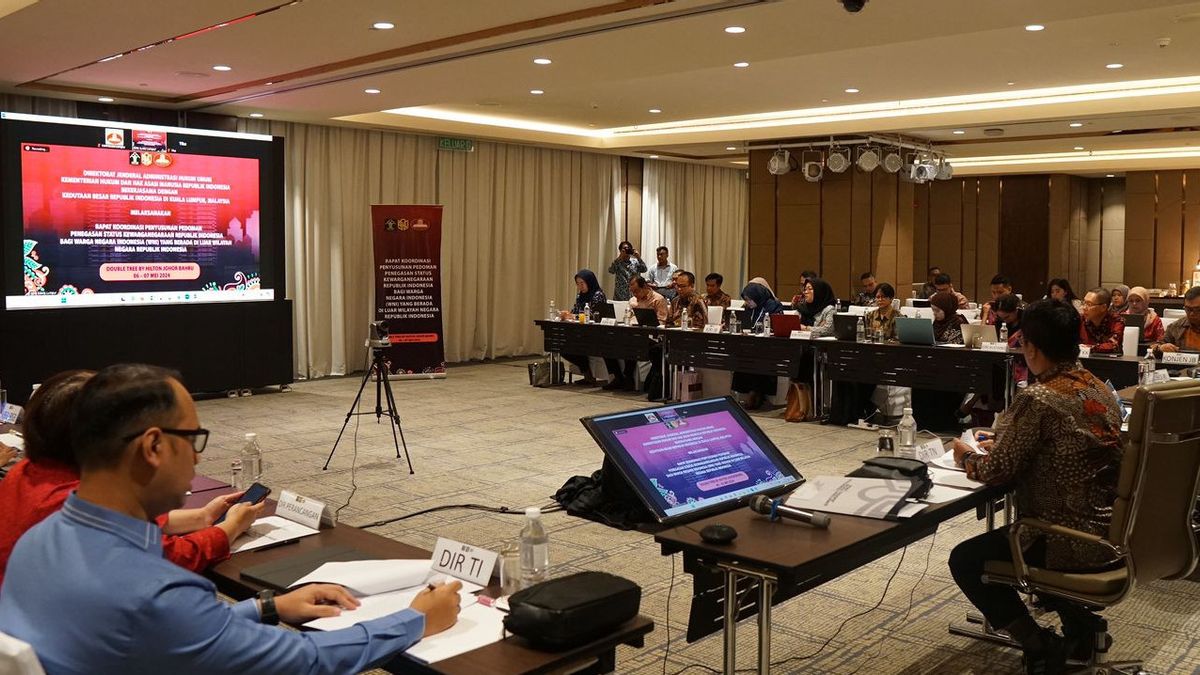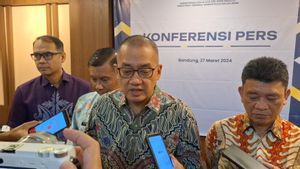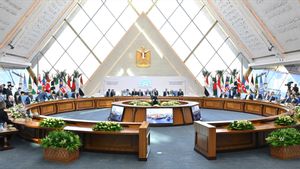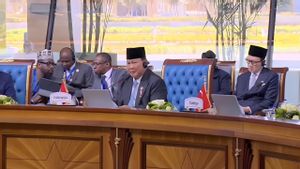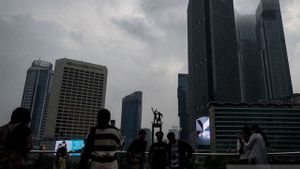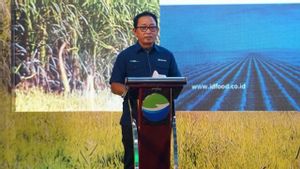JUSHOR BARU Pemerintah Indonesia berupaya menjamin perlindungan status WNI atau keturunan Indonesia di berbagai negara bagi undomcumented citizens yang diperlukan untuk menunjukkan status keterangannya.
One of them is by preparing a legal framework in the form of a Draft Regulation of the Minister of Law and Human Rights (R-Permenkumham) on Procedures for Confirming the Status of Citizenship of the Republic of Indonesia for Indonesian Citizens Outside the Region of the Republic of Indonesia.
"This technical regulation will later become the legal basis for Indonesian Representatives abroad, to carry out analysis and examination in determining the confirmation of citizenship status for Indonesian citizens and children without documents (undocumented)," said Director General of General Legal Administration (Dirjen AHU) Cahyo R Muzhar when opening the Coordination Meeting for the Preparation of Guidelines for the State of the Republic of Indonesia for Indonesian Citizens (WNI) who are Outside the Region of the Republic of Indonesia, in Johar Baru, Malaysia last May 7.
In the coordination meeting, Cahyo appreciated the preparation of the draft Minister of Law and Human Rights (R-Permenkumham) Regulation which was welcomed by a number of Indonesian Representatives. In addition to Indonesian Representatives throughout Malaysia, the activities were also attended by representatives from the Indonesian Embassy (KBRI) Riyadh, the Indonesian Embassy in Begawan Series, the Indonesian Consulate General in Penang, the Indonesian Consulate in Kuching, the Consulate General in Jeddah, the Consulate in Davao, and the Consulate of the Republic of Indonesia (KRI) Tawau.
"We are grateful for the input from various Indonesian Representatives to enrich the substance in this R-Permenkumham. In accordance with the direction of the Minister (Human Law and Human Rights), the preparation of this regulation needs to be accelerated," he said in a statement received by the editor, Monday, May 13.
So far, the Indonesian Representative has confirmed the status of Indonesian citizens (WNI) abroad, but there is no legal basis yet. So regulations are needed in the form of Permenkumham.
SEE ALSO:
First, this Permenkumham aims as a legal basis for Indonesian Representatives in carrying out the affirmation of the status of Indonesian citizens abroad. Second, as a guideline for Indonesian Representatives in affirming status, but not too detailed because those who better understand special circuits in their respective countries are Representatives," he said.
In addition, in the framework of protecting citizenship status by the state, Cahyo also emphasized the importance of the Government making revision efforts to Government Regulation no. 21 of 2022 concerning Amendments to Government Regulation Number 2 of 2007 concerning Procedures for Obtaining Cancellation and Revocation of Citizenship of the Republic of Indonesia (PP No. 21 of 2022). He considered that PP No. 21 of 2022 needs to be extended the validity period of up to 5 (five) years to accommodate children who have not had time to register because the validity period of the Government Regulation will expire on May 31, 2024.
Cahyo also expressed his attention to children born to parents who are clearly Indonesian citizens, but have never lived in Indonesia for 5 (five) consecutive years or 10 (ten) years without success, even though they really want to become Indonesian citizens.
What about the son of a father and mother of an Indonesian citizen, who gets foreign citizenship because he was born abroad, but did not have time to live in Indonesia for 5 or 10 years? He automatically becomes a foreign (citizen), even though he wants to become an Indonesian citizen, this also needs to be an issue that needs to be address in the revision of PP No. 21 of 2022," he said.
This is an embodiment of the state's obligation to guarantee basic rights (basic rights) as regulated in the 1945 Constitution of the Republic of Indonesia, which includes aspects of safety, security, welfare, to other fundamental rights such as health and education guarantees.
He further added that this R-Permenkumham will later regulate the technical flow of the granting of the Statement of the State Status of the Republic of Indonesia (SKSK RI) which is a written document containing information regarding the affirmation of the status of Indonesian citizenship.
"The SKSK will be issued by the Minister of Law and Human Rights and processed electronically by the information technology system to be built by the Directorate General of AHU," he said.
Cahyo also explained that later every Representative will be given electronic access to apply for SKSK as well as conduct inspections and analysis of each application before being submitted to the electronic application of the Directorate General of AHU. After examination and analysis by representatives, if the applicant concerned is indeed considered to meet the criteria as an Indonesian citizen, the Minister of Law and Human Rights will issue a SKSK RI.
"The application for the confirmation of the status of Indonesian citizens, which originally did not have a clear legal basis and was carried out manually, has a clear legal basis and can be processed more easily with this regulation," he explained.
Meanwhile, the Director of State Administration, Baroto, admitted that many problems were found by Indonesian citizens (WNI) who did not have documents (undocumented) and proof of citizenship outside the territory of the Republic of Indonesia. Among other things, the regions of Malaysia, the Philippines, Saudi Arabia and Timor Leste are facing the large number of Indonesian citizens, both in the adult age category and children who cannot show their citizenship documents such as passports and Passport Travel Letters (SPLP).
"The problem stems from the illegal arrival of Indonesian citizens (WNI) to the country, unlawfully marriage and producing offspring, having no clear documents, and clear citizenship status, which has an impact on the difficulty of obtaining access to facilities from related countries, and the potential for loss of citizenship of the Republic of Indonesia because it has lived abroad for more than 5 (five) years but has not reported itself to the representative office of the Republic of Indonesia," he said.
The English, Chinese, Japanese, Arabic, and French versions are automatically generated by the AI. So there may still be inaccuracies in translating, please always see Indonesian as our main language. (system supported by DigitalSiber.id)
